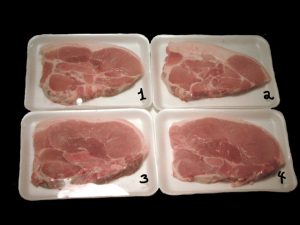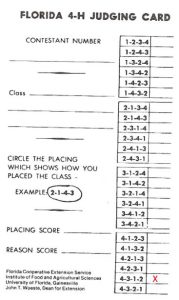Judging teams are a part of the 4-H curriculum that helps to build life skills. Arising as part of the early 4-H club work, judging teams were noted to have begun prior to 1921. In fact, 4-H Clubs were originally called corn clubs, because youth were taught how to grow a better crop of corn and in turn, would bring their corn into town to be judged.
4-H judging teams are short-term, intensive trainings in a particular subject area. The goal of the trainings is to compete at judging team competitions. Judging teams are typically comprised of three or four youth in the same age division, from the same county.
According to the Florida 4-H website (http://florida4h.org/programsandevents_/), the following are sanctioned state-wide judging teams:
- 4-H Consumer Choices/LifeSmarts
- Insectathon
- Dairy Judging
- Dairy Quiz Bowl
- Dairy Goat Judging
- Dog Quiz Bowl
- Forest Ecology
- Hippology
- Horse Quiz Bowl
- Horse Judging
- Horticulture ID and Judging
- Livestock Judging
- Land Judging
- Meat Judging
- Poultry Judging
For our panhandle 4-H members, the North Florida Fair has the following contests:
- Consumer Choices
- Agriculture Judging
- Horticulture Judging
- STEM Challenge
- Wildlife Ecology
Each judging contest has its specific rules and activities; however, the basic components of a judging contest include identification, judging classes, and oral reasons. A good judging team member has the following characteristics:
- A clear idea or mental picture of an items characteristics
- Quick and accurate observation skills
- The ability to weigh objectively and evaluate what is seen
- The ability to defend choices made
Now we want you to try your hand at judging. We will use the meat judging contest as an example. The following is a class of pork sirloin chops. A high quality sirloin chop has lots of meat, little fat, and little bone. A poor quality sirloin chip has little meat, lots of fat, and lots of bone. The sirloin chops are labeled 1, 2, 3, 4. Your job as a meat judge is to rank them in order of best to worst.
This class of pork sirloin chops are ranked 4-3-1-2, with cuts of 3-4-4. Four was placed first because it had the best combination of meat and little fat/bone. Three was placed second because it most resembled number four and had more edible meat than number one. Number one was placed in third because it had less fat and more meat than number two. Number two was placed last because it was the fattest sirloin chop with the least amount of meat.
Each judging class is worth 50 points. If you ranked this class 4-3-1-2, then you received 50 points. If you placed it another way, then you dropped points based on cuts. To learn more about how cuts work, please visit https://texas4-h.tamu.edu/wp-content/uploads/2015/09/photo_judging_contest_reasons2.pdf.
A 4-H meat judging team member would mark their 4-H judging card as seen below.
4-H judging teams provide a safe, positive environment for individuals to learn and develop life skills. Judging teams emphasize experiential activities, organization, allowing youth to take part in leadership activities, and providing opportunities for volunteers to act as mentors to youths.
Benefits of 4-H Judging Teams
- Build self-confidence and problem solving skills
- Communication and public speaking opportunities
- Meet new friends
- Travel the state and country
- Receive a scholarship for college
- Learn observational and critical thinking skills
- Find a new career
- Selecting an animal for a 4-H project
Participating on 4-H judging teams offer many benefits to participants. Team members are exposed to team work, effective communication skills and analytical thinking. Team members also build self-confidence as they become comfortable with all components of judging and evaluation. Development of these skills benefits every area of the 4-H judging team member’s life. An additional benefit from participating on a judging team is having the opportunity to travel to new places and meet and interact with industry leaders. Many times these relationships will aid 4-H members in the future as they choose career paths in any industry.
Many of our 4-H judging contests have national contests associated with them. If you are willing to put in the time and effort to develop skills in one of our contests, then you have the opportunity to travel across the country with 4-H and interact with industry leaders. Locally, several 4-H judging teams from the panhandle have recently participated in national 4-H contests. Members from Jackson County 4-H have been to the national poultry judging contest and national livestock skill-a-thon contest in Louisville in 2019 and the Escambia County 4-H meat judging team will be competing in Colorado in January 2020.
For more information on 4-H judging teams, please visit florida4h.org. Good luck and happy judging!
Special thanks to Brian Estevez, UF/IFAS Escambia County 4-H Agent, for providing this article and pictures.
- Teens As Teachers: Using The Peer Teaching Model in 4-H - May 19, 2023
- Life Skills Focused on Teens - April 6, 2023
- 5 Tips For Building Teams with 4-H Clubs or Groups - August 26, 2022


